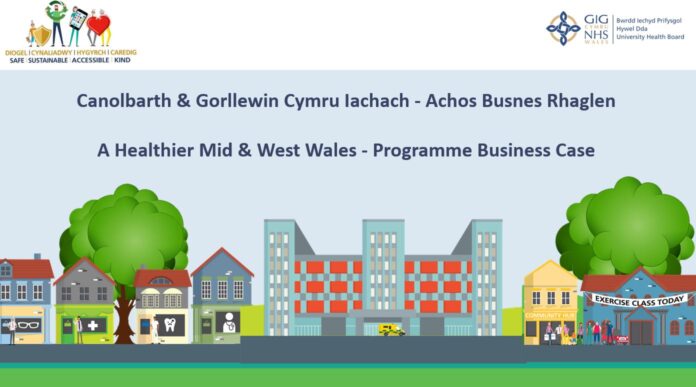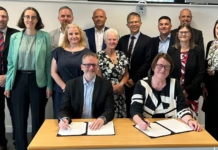Hywel Dda University Health Board will discuss and agree the submission of an ambitious plan to improve health outcomes and well-being of our population.
A Programme Business Case (PBC) for the Welsh Government, will be discussed at the Health Board meeting at 9.30am on Thursday 27 January 2022, available to watch live here.
It’s a milestone in the Board’s journey to achieve its long-term strategy and improvement in population health – A Healthier Mid and West Wales, which followed extensive engagement and consultation in 2018.
It is also the means by which the Board will address long standing challenges, including fragile services, unsustainable workforce and financial challenges, and an aging hospital estate (some of the oldest hospital buildings in Wales).
The PBC offers hope following the pandemic, that health and care can shift from an illness service with a focus on hospital buildings and intervention, to a service that works across boundaries to prevent ill health or deterioration of health, providing help earlier, and wherever possible closer to home.
Steve Moore, Chief Executive of Hywel Dda UHB, said: “This is the first but important stage of producing a business case to Welsh Government to try to secure a scale of investment never seen before in this area of Wales.
“The COVID-19 pandemic has re-enforced the need for change, and we believe this is our once in a lifetime opportunity to improve the health outcomes and wellbeing of our population and create a healthier mid and west Wales and hope for the future.”
The PBC is the first stage of business planning to secure support from Welsh Government in order to proceed to far more detailed planning, analysis and recommendations on the detail of how to proceed.
Included at this stage is a prospectus of investment opportunities, which could be realised over the next decade, to fundamentally improve the way in which health and care services are provided, as well as the environments they are provided from. If supported, investment could exceed £1.3billion, which is a level never seen before in west Wales. This is a significant bid but reflects the enormity of the change and improvement being sought for the benefit of our communities.
Proposals within the plan include;
- the enablement of closer integration and joint working between health and social care, spanning community, primary care (such as GPs, community pharmacists) and hospital services
- investment in existing or new community hubs (such as integrated care centres) across Carmarthenshire, Ceredigion and Pembrokeshire to bring more care closer to home
- a new Urgent and Planned Care Hospital, somewhere between Narberth and St Clears, providing a design separation between planned and urgent care that will protect the ability to deliver both types of care and reduce waiting times; and inclusive of mental health services
- re-purposing or re-build of Withybush Hospital, Haverfordwest; and Glangwili Hospital, Carmarthen, inclusive of GP-led minor injury units, the ability to provide same-day care, and beds for patients who do not need to be in an acute setting but need support
- improvements and modernisation of Bronglais Hospital, in Aberystwyth, and Prince Philip Hospital, in Llanelli. Bronglais Hospital will continue to provide acute emergency and planned care and Prince Philip Hospital will continue to provide a GP-led minor injuries unit as well as acute adult medical care, consultant-led overnight beds and diagnostic support
Changing the way services are delivered and improving the environments will improve patient outcomes, quality of care and patient experience. By bringing together some services onto fewer sites, such as trauma, emergency surgery and A&E, the health board will also be able to improve standards.
To properly appraise all options, as required by Welsh Government business case process, the next stage would look in more detail at how we re-purpose Glangwili and Withybush Hospitals. This would include options to use the current buildings and location, but also potential to re-build them on site.
Another fundamental aspect of the PBC is a focus on providing better conditions and opportunities for staff, to retain and attract the workforce needed. One of the board’s biggest challenges has been workforce shortages and over-reliance, and cost of, temporary staff.
The health board also wants to maximise the social benefit from the way it works and anticipates the proposed investment would bring significant economic benefits for our communities. For example, the procurement (purchasing) strategy is to increase the proportion of spending with local suppliers or providers that support job opportunities for more vulnerable citizens or local employment, training and apprenticeship opportunities.
The PBC recognises the need to create a digital infrastructure that will enable the health board to connect with patients and service users in all settings, creating a health system ‘without walls’. This would include innovations, such as wearables, more advanced electronic health records, and greater use of technology to simplify processes including admission and discharge.
It is through this transformation that the health board believes its buildings and infrastructure can support NHS Wales decarbonisation strategy.
Mr Moore added: “I understand the strength of feeling and passion for our NHS that our staff and public have and we want to continue to harness that and keep engaging with our communities as we build more detail around these plans.
“To enable a generational shift to a wellness system we need the whole package of prevention and early intervention, at all stages of life. That includes the backbone of strong and sustainable primary and community services; proper provision of rehabilitation and therapies; acute hospital services that are able to provide the standard of provision our communities deserve; and a supported workforce.”
Following a formal endorsement from the Welsh Government, the health board will then move to the next stage of individual outline and final business cases for elements of the programme. There will be a need for regular engagement, and possibly consultation on parts of the programme, with patients, public, staff, and partners.
In the meantime, the health board will continue with the process around site selection and preparation for the new urgent and planned care hospital. We are working with the Consultation Institute to ensure public involvement in the criteria and final scoring of options. We will share progress on this as more information is available. It is hoped a preferred site will be identified in the summer.



| [donate]
| Help keep news FREE for our readersSupporting your local community newspaper/online news outlet is crucial now more than ever. If you believe in independent journalism,then consider making a valuable contribution by making a one-time or monthly donation. We operate in rural areas where providing unbiased news can be challenging. |



















